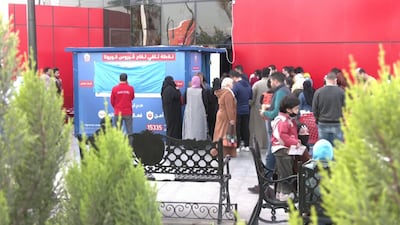Live updates: follow the latest news on Covid-19 variant Omicron
Egyptian footballer Mohamed Salah has been praised for using a high-profile television appearance to urge viewers to be vaccinated against Covid-19.
Hopes are high that Salah's message will help Egypt defeat coronavirus.
In a widely watched interview with Egyptian talk show host Amr Adib, Liverpool forward Salah likened people ignoring the advice of health experts and refusing to get vaccinated to people telling him how to play football.
“They are doctors who have been working and studying medicine for years,” he said.
“If I said vaccination is wrong, then I'd be like anyone in the street telling me how to play football.
“If the World Health Organisation says it's the right thing to do, we need to follow them – that is my point of view.”
The star is wildly popular and a hero to many in his home country of 100 million people.
Within weeks of the interview's broadcast, many of his fans – who had previously been hesitant to have inoculations – say they are now considering them.
“Everyone in Egypt looks up to Mohamed Salah and though I had already been vaccinated before I saw his interview, I really respected him for taking the time to promote vaccinations in Egypt,” said Mohamed Hussein, 29, a business developer.
“I definitely think that many Egyptians who might have been resistant to vaccines will now get them. Celebrities have that effect.”
Egypt’s vaccination rates increased significantly throughout 2021, thanks to widespread awareness campaigns by the health ministry.

The vaccination drive was partially helped by government regulations banning public sector employees from entering their workplace unless they are fully vaccinated.
While some of the footballer’s fans were swayed by his message, others felt that other Egyptian celebrities had more of an effect on people’s attitudes towards vaccinations.
“Mohamed Salah is popular, but I don’t know how much of an effect his interview had on vaccination rates. I think the death of comedian Samir Ghanem in May and his wife Dalal Abdel Aziz in August, definitely had more of a sway on Egyptians,” said football fan Karim Deifallah, 34,
“Both of them were very popular and their deaths broke the hearts of millions of fans. So I think that was more a successful cautionary tale than Salah’s comments.”
An Egyptian doctor agreed, telling The National that celebrities in general have had a marked effect on the way people think about Covid-19 vaccinations.
“Something I have come across a lot since the pandemic began is that often people repeat to me concerns and opinions about vaccinations that they have heard their favourite celebrities say,” said Fakhry Ahmed, a pulmonologist.
“While I don’t know how much of an effect Salah’s interview had. I can say with the utmost certainty that celebrities have played a huge role in shaping public opinion about the pandemic throughout the last two years.”
However, some of Salah’s fans have taken his vaccination advice to heart.
“Mo Salah is one of us. He was born here and he has never forgotten about his home country. But we didn’t travel and see the world. I’m sure his time abroad must have taught a lot,” said Ali Khalil, 52, a doorman in the Cairo district of Heliopolis.
“So I know that when he is giving me advice it will be correct and that he is doing that because he cares about us, his fans,”
Egypt is in the grip of a fourth wave of the pandemic. Officials reported 879 new infections and 49 deaths on Saturday, but while these numbers accurately reflect the country’s infection curve, it is widely acknowledged that the real number of infections is probably much higher. The Health Ministry only counts patients who test through government testing centres, and does not include data from private labs.






















